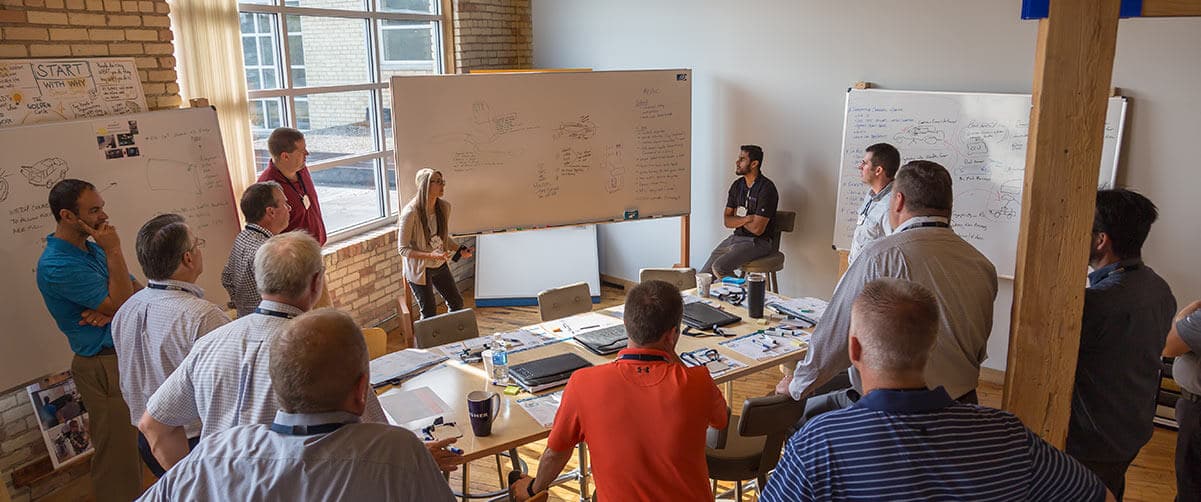A Healthy Culture Reduces Ankle Biters
July 24, 2018

Written By:
Kevin Pinner | Business Lead | Manufacturing Tech

Meet Scout. Scout is an English Springer Spaniel. Scout is cute. Scout is a lot of work.
My wife and I are dog lovers. We talked about our dogs on our first date. We always assumed that we would have a dog at some point during our married lives. Our first dog was Cooper. She was a beautiful Golden Retriever who lived with us for 16 years. What a beautiful dog with a winsome temperament. For those of you who have dogs, you understand that losing one is like losing a member of your family. After Cooper, we were “dog-less” for almost a year. We had quite a bit of flexibility in our schedule during this time but it was a little too quiet around the house.
That didn’t last for long.
As we discussed adding another dog to our family, we decided to get a different breed. I have always thought English Springer Spaniels were pretty dogs. We did the research and learned that they are energetic and highly spirited but not to the extreme like some other breeds. We took the plunge and brought home this cute, little puppy about ten months ago.
One of the first behavioral differences we noted in Scout versus Cooper was her need to chew. We did a fairly good job of protecting our furniture, but an unexpected and unprotected area was our feet and ankles. When we least expected it, she was chewing on our socks or ankles. At first it was cute, but soon it became a nuisance. She was an ankle-biter.
Ankle-Biters in Business
Ankle-biter: ‘aNGkəlˌbīdər’; (slang) a relatively minor, irritating problem or task.
I have a business colleague who uses the term ankle-biter to describe those annoying and relatively small problems that arise in a business that can drive you crazy. They may not be individually significant but collectively over time they can demand quite a bit of time and energy. As a leader, it can be exasperating to continually deal with the same small problems over and over again. We begin thinking to ourselves, “Why can’t our own team take care of these problems?! Do I need to solve every problem around here?!”
Ankle-biters in business are often a cultural problem. Every organization has a culture. And culture happens whether you recognize it or not. An easy, working definition of organizational culture is: “That’s how work gets done around here.” The culture of an organization can actually support the very type of behavior that the organization’s leaders want to eliminate.
How to Drive Cultural Transformation
You can either manage your culture, or it will manage you. I like the way that Connors and Smith describe this phenomenon in their book, Change the Culture, Change the Game. In the book it states,
“Every company has a culture. That culture either came about as the result of a methodical effort to build it, or it has developed willy-nilly, for better or worse. Whether it arose from a deliberate process or not, you must ask yourself one important question: If everyone in the organization continues to think and act in the same manner as they do today, can you expect to achieve the results you need to achieve?”
Of course, the answer to this question is: you must change the culture. But how do we change it? The organization’s leader must take the lead for real cultural transformation to occur. It cannot be delegated to Human Resources or a Culture Committee. And it will take every leader in the organization to believe-in and daily practice the values and beliefs to build the culture.
Many leaders feel ill-equipped for this type of effort. Perhaps they have tried to bring about cultural change in the past to no avail. That’s where a coach comes in. Having a resource with the skill set, tools, and experience will substantially increase the probability of lasting change.
Back to Scout. My wife and I realized that the training process that worked for our Golden Retriever was not going to work for training an English Springer Spaniel. So, what did we do? We hired a coach. Our dog trainer brought techniques, perspective, experience, and (very importantly) encouragement during our training. We have realized the hard work involved to bring about new behaviors. And we recognize that the only way to get different results is through a deliberate process.
Want to know more about culture-building? At DISHER, we have discovered over the past 18 years that successful organizations do not leave culture to chance. Instead, they intentionally design a culture for high performance often with the help of professional coaching. DISHER has had the privilege of being recognized by FORTUNE and Great Place To Work as one of the Best Small Workplaces in America. We are passionate about assisting companies to build their culture. We offer an Organizational Development approach that is both people-centric and data-driven using the Denison Organizational Culture Survey (DOCS).
Let us know how we can help reduce those nagging ankle-biters within your organization and give you the freedom to focus on higher performance.
Written By: Kevin Pinner, Business Lead – Manufacturing Tech Services
Kevin enjoys improving processes – manufacturing or business processes. When he isn’t doing that, he enjoys playing soccer, running, mountain biking, and driving old sports cars. Kevin has a BS in Industrial Management and MBA in Finance. Kevin leads the Disher Manufacturing Tech Services and DISHER Business Solutions Teams.



